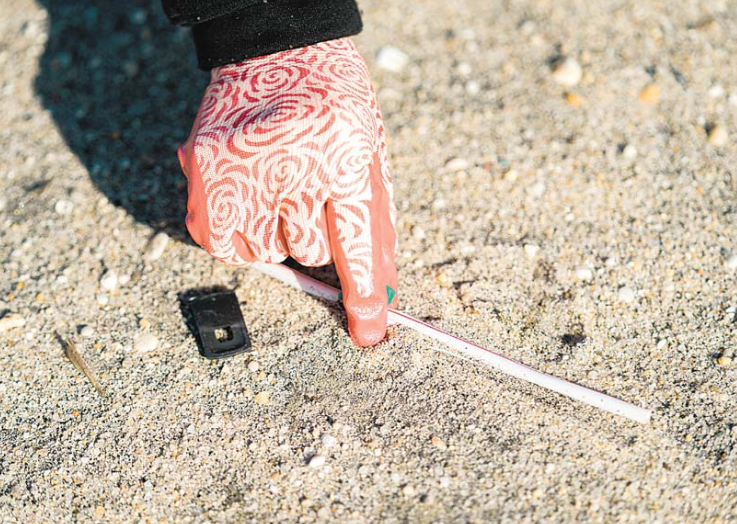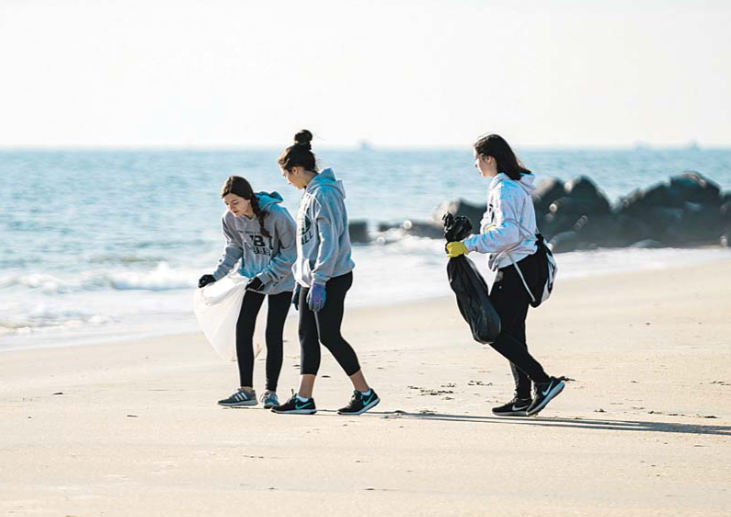
Photo by Patrick Olivero
SEA BRIGHT — It’s a longstanding summertime tradition for families to get up on a warm summer morning, pack their cars with bags of food and head down the shore for a day at the beach.
But what they might not think about, after the sun sets and the beach chairs are folded up, is that some plastic bags left behind will tumble with the wind, into the ocean, and end up endangering marine life.
Sea Bright, a popular beach town in the Two River area, wants to use its power to prevent that from happening off its shores.
The borough council introduced a single-use plastic ban ordinance at the Nov. 18 meeting. It will be up for a public hearing and potential adoption at the council’s next meeting Dec. 3. It was unanimously introduced by council members present; Councilman Charles H. Rooney III was absent.
“I think it’s a good thing. We’re a beach town. We get entirely too much trash in the summertime and a good portion of that is plastic. And plastic ends up in the ocean,” said Councilman Kevin Birdsall. “If we can do our one small part to prevent that from happening, that’s what we’ve got to do.”
If approved, the ordinance will take effect Jan. 1, 2020. It will restrict businesses or stores from providing customers with single-use plastic bags, utensils, balloons, straws or polystyrene foam containers. This includes, but is not limited to, pharmacies, supermarkets, grocery stores, convenience stores, clothing stores, surf shops, dry cleaners, food marts and food service establishments. Plastic utensils may be distributed upon request by a customer.
Some Two River municipalities with single-use plastic bans allow businesses to provide their customers with plastic straws upon request. Sea Bright’s proposal, however, will not.
“There’s no reason anyone would need a plastic straw,” said Councilman Marc Leckstein. “But we did want to leave in the plastic utensils because some people when they get takeout, they may not have the ability to eat in their car or wherever they’re going,” he said.

Photo by Patrick Olivero
Fatima Tarek, manager of the 7-Eleven in Sea Bright, said she supports the idea and thinks it will be great for the town and the environment. “They (the public) don’t dispose of their bags correctly,” she said, adding that she and other employees sometimes find plastic bags and straw wrappers on the ground in their parking lot.
She did, however, express some concern to Leckstein before the ordinance was introduced about the ban on all plastics. She said that 7-Eleven serves soda in plastic cups, but that they are multi-serving cups and that customers can bring them back to be refilled for discounted prices. For that reason, Leckstein told her that the store would be able to continue using them.
She said all cups can be refilled, except for paper coffee cups.
The ordinance will allow stores to provide customers with a single-use paper carryout bag or a reusable carryout bag, as long as the store imposes and collects a minimum bag fee of 10 cents per bag, it states. That does not apply for produce or product bags, however. All paper carryout bags must be 100 percent recyclable and must include at least 40 percent post-consumer recycled content, according to the ordinance.
Plastic balloons will be banned from the beaches in Sea Bright and no one will be allowed to release balloons into the air from any beaches in the borough.
“I’m at the beach every single day, either for surfing or walking the dog, or just taking a walk in general. And I see this plastic and this garbage everywhere,” said Melissa D’Anna, owner of Lucky Dog Surf Co. in Sea Bright. “Every little bit helps and this is a tremendous leap forward for our town.”
The ordinance states that any person found guilty of violating the code would be fined $100 for the first offense, $500 for the second and $1,250 for the third.
Birdsall noted that it may be hard to get everyone on board at first and it may be hard to police it, “but it’s a learning lesson,” he said. “You’ve got to start somewhere and we’ll figure things out as we go along.”
Last year, Rooney asked borough residents and establishments to “skip the straw,” in an attempt to maintain a healthy oceanic environment essential to the borough’s success. Aside from plastic, there are paper straw options and stainless steel straws for personal use. The inspiration for Rooney arose after Clean Ocean Action released its 2017 report from its annual beach sweeps, showing that plastic accounted for almost 85 percent of the debris collected.
The 2018 report shows that plastics were, again, the most common items picked up at beach sweeps in the fall and spring. Of the total 454,365 debris pieces collected from sweeps in both seasons, plastics accounted for 73.91 percent; foam containers, 7.86 percent; glass, 4.96 percent; rubber, 2.11 percent; metal, 3.99 percent; paper, 3.21 percent; wood, 2.74 percent;and cloth, 1.22 percent.














